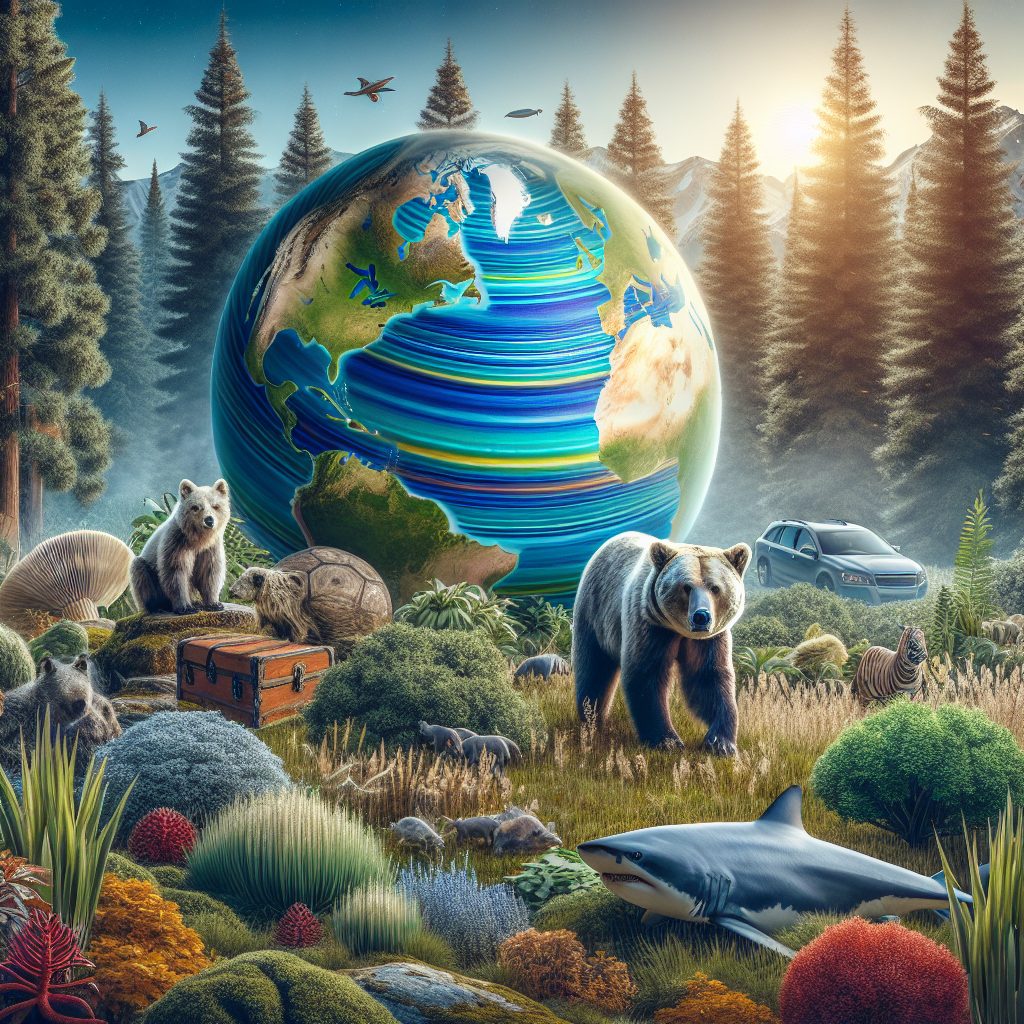
Ozone depletion and biodiversity are two interrelated topics that have become increasingly important in our society. Ozone depletion occurs when chlorine and bromine compounds destroy molecules of ozone in the atmosphere. This can cause thinning of the ozone layer and creation of ozone “holes”. Such damage can create harmful UV radiation for living creatures, such as humans and animals, which can lead to problems such as sunburn and increased risk of skin cancer. Not only does this pose a threat to human health, but it can also damage plant life.
Biodiversity is defined as the variety of living organisms found in an area. It is important for ecosystem health and environmental balance. Biodiversity can be impacted by ozone depletion because areas that experience ozone damage are in danger of losing some species of plants and animals that may already be vulnerable due to climate change. Thus, the combination of ozone depletion and biodiversity is of great concern to environmental scientists and policy makers. In the next section, key takeaways related to this issue will be discussed in more detail.
Key Takeaways
1. Ozone depletion has a significant impact on biodiversity as it affects the photosynthesis process and the community structure of species in the atmosphere.
2. Ozone molecules filter out harmful UV radiation from reaching Earth, allowing many of the world’s organisms to thrive.
3. Human interaction with the environment, particularly industrialization and ozone-depleting substances, have been linked to rapid decreases in ozone levels.
4. Sea turtles, plankton, coral reefs, amphibians, and plants are susceptible to increases in UV radiation, which can be lethal or dangerous in high exposure.
5. There are many ongoing international efforts to restore the ozone layer, such as the Montreal Protocol which specifically addressed the regulation of ozone-depleting substances.
What Does Ozone Depletion Have to do With Biodiversity?
Effects of Ozone Depletion on Biodiversity
Ozone depletion has a strong effect on biodiversity as the ozone layer helps to filter out potentially harmful ultraviolet (UV) radiation from the sun, and reduce UV radiation exposure on the earth’s surface. With an increase in the amount of UV radiation that the earth’s surface is exposed to, there is an increase in the occurrence of skin cancer, eye damage, weakened immune systems, and even plant damage that lowers the success of photosynthesis in some plants. As a result, ecosystems throughout the world are being damaged, leading to a decrease in the availability of natural resources that species depend on.
How Different Species are Affected?
Animals: Animals throughout the world are affected by the decrease in resources available due to ozone depletion. In particular, animals with thin fur, such as the Artic Fox, suffer as their fur becomes more exposed to the sunlight and UV radiation, thus making them more susceptible to cancer and skin damage.
Plants: Plants, such as crops and forests, can be affected by increased exposure to UV radiation. Many plants, such as wheat, soybeans, rice, and corn are quite sensitive to radiation and may experience damage to their DNA and decrease in their photosynthetic abilities.
Marine Species: Ozone depletion results in an increase of UV radiation on the oceans, which can damage plankton, reduce animal’s ability to reproduce, and lead to increased mortality rates. In addition, since UV radiation can penetrate deep into the water, it can affect biodiversity even at the deepest depths.
Strategies for Mitigation of damage
Elimination of CFCs and other ozone-depleting chemicals: CFCs, (or chlorofluorocarbons) are refrigerants that have been linked to ozone depletion over the past century. Through international agreements such as the Montreal Protocol, it has become necessary for countries to stop the production of these harmful substances, and instead replace them with other non-ozone depleting agents.
Replanting of Trees and Forests: Planting more forests and trees can help to mitigate the effects of ozone depletion as they act as a shield from the sun’s radiation. In addition, certain plants and trees are able to absorb ozone-depleting chemicals from the air, helping to reduce the effect of their presence in the environment.
Alternative Energy Sources: The burning of fossil fuels causes ozone-depleting chemicals to be released into the atmosphere. By utilizing alternative energy sources, such as solar, wind, and hydropower, countries can reduce the amount of emissions released into the atmosphere.
Tips To Help Mitigate Ozone Depletion and Save Biodiversity:
1. Buy energy efficient appliances as these help to reduce the production of ozone-depleting chemicals.
2. Reduce your burning of fossil fuels and look for green transportation alternatives.
3. Support the planting of more trees and plants in your local area or neighborhood.
4. Utilize natural pesticides and herbicides that will not be dangerous to the ozone layer or any other relevant parts of the environment.
5. Support NGO’s, such as the World Wide Fund for Nature, who are leading the fight against ozone depletion and advocate for the protection of biodiversity.
6. Educate people you know about the importance of ozone layer preservation.
Questions:
How Does Ozone Depletion Affect the Environment?
The ozone layer shields the Earth from harmful UV radiation. This radiation is known to cause skin cancer in humans and can also hurt other living things. Ozone depletion has been linked to the deterioration of coral reefs, an increase in drought, and even changes in the genetic makeup of plants. Such losses in biodiversity can be difficult to replace and can alter the planet in ways that scientists are still struggling to understand.
What Are the Major Causes of Ozone Depletion?
Ozone depletion is largely caused by the release of certain chemical compounds, known as chlorofluorocarbons (CFCs). These CFCs are released into the atmosphere primarily as a result of human activities, such as industrial processes or the production of certain consumer goods like aerosols and refrigerants. CFCs are highly persistent and can remain in the atmosphere for years before they break down.
Is Ozone Depletion a Global Problem?
Yes, ozone depletion is an international problem that impacts people and places all over the globe. Ozone depletion has caused an increase in UV radiation levels worldwide, and this heightened radiation has been linked to a variety of problems. These problems range from decreases in crop yields and health issues to a decrease in ocean life in parts of the world due to increased UV radiation.
Are There Economic Consequences of Ozone Depletion?
Yes, the economic consequences of ozone depletion can be significant. Many of the effects of ozone depletion have an adverse effect on human health and agricultural production, both of which have a direct economic impact. Additionally, the implementation of regulations to curb the release of CFCs and other ozone-depleting substances has had major economic consequences in terms of added production costs, new technologies, and modified consumer behavior.
What Are Some Environmental Solutions to Ozone Depletion?
The most effective environmental solution to ozone depletion is the implementation of policies that limit the release of CFCs and other ozone-depleting chemicals into the atmosphere. Additionally, individuals can help reduce the severity of ozone depletion by conserving energy, reducing their consumption of aerosol products, and avoiding the use of CFC-emitting products such as refrigerators.
What Are the Long-term Effects of Ozone Depletion?
The long-term effects of ozone depletion are still being researched, but it is thought that the effects will likely become more severe over time if the ozone layer continues to be depleted. Some of these effects may include an increase in skin cancer, a decrease in biodiversity, and an increase in UV radiation levels.
Are There Natural Processes Which Contribute to Ozone Depletion?
Yes, there are some natural processes which contribute to ozone depletion, such as volcanic eruptions. Volcanoes have been known to emit sulfur dioxide into the atmosphere which has been linked to a depletion in the ozone layer. Additionally, certain sagebrush and wild fires can have similar effects.
Can Ozone Depletion Be Reversed?
Yes, ozone depletion can be reversed through the implementation of regulations or policies that limit the release of ozone-depleting substances into the atmosphere. Additionally, individuals can help reverse ozone depletion by reducing their reliance on CFC-emitting products and engaging in environmentally conscious practices.
How Has Ozone Depletion Harmed Biodiversity?
Ozone depletion has been linked to decreases in biodiversity due to the fact that it increases UV radiation levels which can be damaging to a variety of plant and animal species. This decrease in biodiversity can lead to further alterations in the environment that scientists are still struggling to understand.
What Are Some of the Health Effects of Ozone Depletion?
Exposure to higher levels of UV radiation due to ozone depletion has been linked to human health issues such as skin cancer, eye damage, and immune system suppression. It has also been linked to a decrease in crop yields and a decrease in ocean life in parts of the world.
Final Thoughts:
Final Thoughts on Ozone Depletion and Biodiversity
The effects of ozone depletion on our environment are far-reaching and difficult to understand. Though we may not understand the nuances of ozone depletion’s consequences on the planet’s biodiversity, we must take action to limit the release of ozone-depleting substances into the atmosphere. Through policy-level changes and individual changes in behavior, we can help ensure that the ozone layer will be preserved for the benefit of our planet and our future generations.
Ozone depletion has had a tangible and severe effect on the biodiversity of our planet, and it is unlikely that the consequences of ozone depletion will disappear soon. We must be vigilant in our efforts to reduce ozone depletion and strive to protect our environment for the future.



